
The Island of Malta (Valletta, Malta). Island number 29 (out of 100), country number 26 (out of 25), month number 29 (out of 100.)
The small island of Malta is part of Europe and the EU. But geographically is is actually closer to mainland Africa than to mainland Europe. (It’s just 497 km Tunisia but 677 km to Italy.)
Historically the island has belonged to all kinds of rulers: The romans, Morrs, Knights of Saint John, the French and the British and visitors from Africa, the Middle East and Europe has arrived on the island for at least 4000 years. Malta is an island that is connected to many other parts of the world.
It is now an independent nation and a member of the EU.
At the time that I visited Malta the Italian government had just announced that they would not allow ships with refugees from Africa to dock in the country.
People on both sides of the political spectrum are upset.
Some because they are angry about all the African refugees coming by boat to Europe. (“They have to be stopped!”)
Some are in shock about how the refugees are being turned away, or worse, die at sea. (“We have to let them in!”)
But to think that it would be possible to stop people from one continent from trying to reach another is naive. Humans have travelled across from Africa to Europe for tens of thousands of years, and with technology it is just getting easier and easier.
On the other hand: to instantly allow any person in Africa who wanted to come and live in Europe to do so would most likely create a huge strain on the European political system and society at large.
As a Swede I am blessed with one of the most generous passports in the world where I can travel almost anywhere and to most countries I can do it easily and without even having to apply for a visa.
I dream of a world where every person on earth is allowed to travel anywhere without a visa.
Unrealistic?
Of course not.
For most of human history visa free travel has been the norm. And a beautiful result of the European Union is the ability to travel across scores of national borders.
A “World Union” where all countries let all citizens travel all over the planet is a goal we should thrive for.
Not necessarily because we should encourage more people to move physically, but to move people’s minds.
And not necessarily to let anyone, anywhere move anywhere right away.
Uncontrolled human movements sometimes get out of hand. That is why the Chinese government put limitations on who can live in their cities and thus have less slums than, say India.
Or why a tiny, crowded country like Singapore control how many people are allowed to live in its tiny island.
But the vision should be a borderless planet with as few restrictions as possible.
As a first step we could restrict people’s right to settle down, but let anyone come as a tourist and/or to do business for, say one month where the default is that you are allowed to come and restrictions are only put in place when needed.
As a person from Sweden who already have the right to (more or less) travel short term to anywhere I know the feeling that creates: A feeling of immense freedom.
Not being able to travel when you want to is best described as having your spirit in jail.
We should thrive for a world where as many people as possible are allowed to let their spirits free.
As I leave Malta to fly to Sweden I make a vow to work towards a more borderless world.
Fredrik Haren, aka “The Island Man”, plans to visit 100 islands, in at least 25 countries, on at least 6 continents – in less than 100 months. The purpose of this “World Tour of Islands” is to get a better understanding of the world, a deeper understanding of the people who live here and a broader understanding of life. The island of Malta was island number 29, country number 26 and month number 29.
(Countries visited so far: Austria, Canada, China, Egypt, France , Hong Kong, Iceland, India, Indonesia, Ireland, Mauritius, Malaysia, Maldives, Mongolia, Myanmar, New Zealand, Nigeria, Norway, South Africa, Sweden, Thailand, Vietnam, United Kingdom, USA, Italy and Malta.)
(Island visited in June 2018, text published October 2018.)